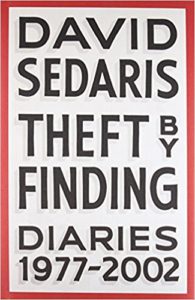Theft By Finding: Diaries 1977-2002 by David Sedaris
 Snotty Literati dips into diaries this month! David Sedaris, humorist/writer/artist, is—it turns out—a habitual diarist. As he explains in the intro to his first volume, Theft By Finding (1977-2002), he spends forty-five minutes per entry. These are seemingly random reflections, covering cultural shifts and geographical moves. Sedaris hitches across country, picks fruit, cleans houses, works construction, drinks coffee in multiple IHOPs, gets a degree from the Art Institute of Chicago, dips into the New York theater scene, mourns the death of a parent, maintains a long-term relationship, studies French in France, and works as an elf in Macy’s for Christmas. Taken together, they form a single picture. Or do they?
Snotty Literati dips into diaries this month! David Sedaris, humorist/writer/artist, is—it turns out—a habitual diarist. As he explains in the intro to his first volume, Theft By Finding (1977-2002), he spends forty-five minutes per entry. These are seemingly random reflections, covering cultural shifts and geographical moves. Sedaris hitches across country, picks fruit, cleans houses, works construction, drinks coffee in multiple IHOPs, gets a degree from the Art Institute of Chicago, dips into the New York theater scene, mourns the death of a parent, maintains a long-term relationship, studies French in France, and works as an elf in Macy’s for Christmas. Taken together, they form a single picture. Or do they?
 Lara: Full Disclaimer: I love David Sedaris. Love love love love love him. Naked and The Santaland Diaries are my favorite collections, even though Me Talk Pretty One Day seems to be the People’s Choice favorite. I have seen him read in person and even have an autographed copy of We Are Engulfed in Flames (isn’t his handwriting lovely? And of course he drew a bleeding porcupine, because why not?) And, despite all that, I didn’t love this book. I am not sure how much I believe these are fresh off his diary page without some editing. And that makes it feel a little disingenuous to me. I am cringing as I type this and my heart is breaking a little inside.
Lara: Full Disclaimer: I love David Sedaris. Love love love love love him. Naked and The Santaland Diaries are my favorite collections, even though Me Talk Pretty One Day seems to be the People’s Choice favorite. I have seen him read in person and even have an autographed copy of We Are Engulfed in Flames (isn’t his handwriting lovely? And of course he drew a bleeding porcupine, because why not?) And, despite all that, I didn’t love this book. I am not sure how much I believe these are fresh off his diary page without some editing. And that makes it feel a little disingenuous to me. I am cringing as I type this and my heart is breaking a little inside.
Jennifer: As it should . . .
Counter-Disclaimer: I loved this book so much. I’m a fiction-freak, and this was—I think, as of right now—my favorite book of the year so far (and it’s the middle of November). I think it’s brilliant. I buy the fresh-off-the-page thing, with caveats.
I think I need to explain stuff. I’d like to think of myself as a writer. I see this as a book for writers, frankly. I listened to it on audio (which he narrates) and I have a hard copy—because it’s like a creative writing text. It’s almost everything I love about writing prose. Inspired by him, I’ve taken it upon myself to try this chronicling-business. I can say more about that. But one thing I’ve already learned for sure: writing is performance. It is always artifice, always—even at its most candid, disingenuous to some extent. That said, Sedaris, I’d say, specializes in intimacy and candor. So he’s as disingenuous as any great writer is, and he’s incredibly honest too.
Lara: That might be my problem with it. It’s not like his other collections. And it’s not a book that I think is intended to be read in just a few sittings. The entries aren’t connected and some days he chooses to share a simple one-liner from the day, versus other days that go one for what has to be the 45 minutes he allots for writing each day. I do think this is more a book for writers than it is for readers.
Jennifer: Yes, it’s the ultimate crash-course on writing with candor. I actually found it addictive, like I couldn’t stop listening . . . I do want to reiterate what you just said about the discontinuity of the entries. For the sake of the writers out there! Consider some of the traits of his diary entries:
- There is no continuity between entries (unless it’s natural)–he never “picks up where he left off” or tells us what happened next. He just moves on. What purpose might this serve? It removes any boring exposition.
- He is willing to reveal his own horribleness. AND I LOVE THIS AND ADMIRE IT SO MUCH. Vulnerability, recognition of foibles, tapping into the universal—these are the things that make his writing awesome.
- There is minimal exploration of emotional life or philosophical implications–no great soliloquies on the personal impact or emotional weight of his observations. He says he does this because emotions are so changeable.
- He is all showing, no telling.
- All that we know about Sedaris, we know largely by watching him in scenes.
- Careful observation, sharp perceptive skills, and eavesdropping serve him well
- Sedaris really plays up the art of dialogue.
- He’s attuned to absurdities.
- There is no introduction to people or scenarios.
All of this adds up to the best writing book ever.
Lara: I agree that the way to consume Sedaris is through audio. He’s a master storyteller. And these stories ranged from cringe-worthy to heartbreaking, from what-the-fucking to wow. He really has been exposed to a lot of crappy people.
I almost couldn’t take all the pussy-grabbing talk of his construction worker peers in North Carolina. And the racism—so much racism—that he saw.
It was fascinating to know he got his first feature in Esquire and was still cleaning houses.
And, I recall him mentioning Wilma Mankiller, the Cherokee Indian Tribal Chief in Oklahoma, who my stepmother worked for as her Communications Chief and who I had the honor of meeting before her passing. She was an incredible woman and yet I can’t remember what his passage said about her.
Jennifer: I actually don’t know. Yes, he witnesses supreme gross behavior and blatant racism. I think what’s so amazing is that he remains apart from it. He’s somehow a voyeur. And you say that he has been exposed to a lot of crappy people? I know I’m pretty dark and oft cynical, but . . . I might suggest that most people are pretty crappy, and Sedaris is perceptive enough to notice. Of course there are also a lot of drugs. Thoughts?
Lara: I think his morbid curiosity is what aids his success as a writer for sure. He at times comments that he wished he stepped in or said something, but we also know that can be dangerous. As for the drugs, yes… there were a lot of them and I have to wonder how that colored his memory or fueled his writing.
I also have to say that I replayed the part where he and Hugh were at a dinner and two older women walked by them on their way out. One of them farted near Hugh’s head. The trumpeting sound that accompanied that entry made me laugh and made my son giggle. No worries, that was the only part I let him listen to. Sedaris is definitely NSFK (that’s “Not Safe for Kids”, Jennifer).
Jennifer: I’ve used this as an example of good writing, and one of my students didn’t like him at all and she shook her head and muttered, “Vile, vile, vile.” It was the drugs.
Now, you know I’m the Anti-Drug Queen, but I have to say that I saw it as a part of a life, the life of an artist. It’s ugly and unflattering, but it’s real.
Lara: It was real. And authentic. But how accurate? That’s what I just don’t know.
Jennifer: I did want to follow up on something you mentioned. You wondered if all writers keep a journal or diary. I’d say no, they do not. In fact, when I was getting my MFA, a fellow student said something I still think about (and I don’t remember her name). She said that she threw out all her diaries and stopped keeping one when she decided to become a writer—because she consciously decided to write exclusively for an audience. She would no longer write just for herself.
I really took this to heart—I internalized it. I made it my own thing too. I don’t write for myself either. I write to be read. I write to be read, even if it’s for an audience of one. Being read by others is the necessary completion of the artistic act.
And my guess is that Sedaris was always conscious of this, that he planned on being read.
Lara: I have probably 25 journals that have fewer than 10 pages written in them. While I don’t feel like I am writing for anyone, I don’t like gaps. I feel like if I start on a Monday and skip Tuesday and Wednesday, when I come back on Thursday, I have to fill in the gaps. That’s hung me up and it’s stupid. I need to be okay with the randomness of I am going to keep any kind of diary.
Jennifer: It’s all so very random, so I’ll just give you two samples of this book:
June 22, 1999
ParisMy friend Barb claims that when asked to justify his behavior, Ted Bundy responded, “Well, there are so many people.”
October 8, 1999
RegensburgThe movie ‘Groundhog Day’ was released in Germany with the title Eternally Weeps the Groundhog. That is so beautiful.
Lara: Here are two of my favorite passages:
“Making it worse, I had to sit through another endless preview for ‘Titanic’. Who do they think is going to see that movie?”
Preach dear David, PREACH!
“That’s the thing with a diary, though. In order to record your life, you sort of need to live it. Not at your desk, but beyond it. Out in the world where it’s so beautiful and complex and painful that sometimes you just need to sit down and write about it.”
Next Up!
We are finishing up individual reading and will return shortly with our best of 2017 lists.
Happy Reading, Snotties!
_______________________________________________________________________
Can’t get enough of Snotty Literati? Follow us on Facebook!
Want to read more from Jennifer? Check her out at www.jenniferspiegel.com
Want to see what Lara is up to? Stay right here at www.onelitchick.com
